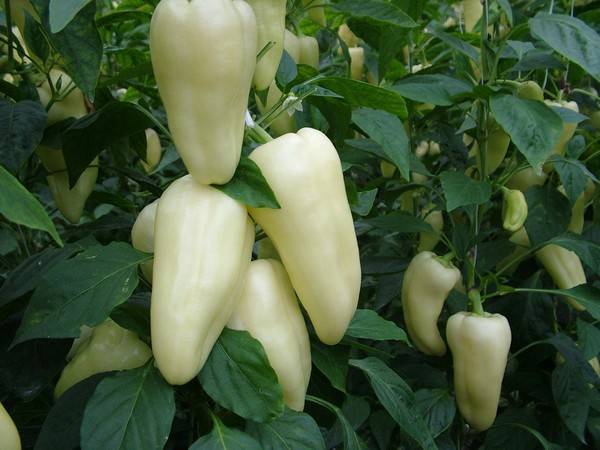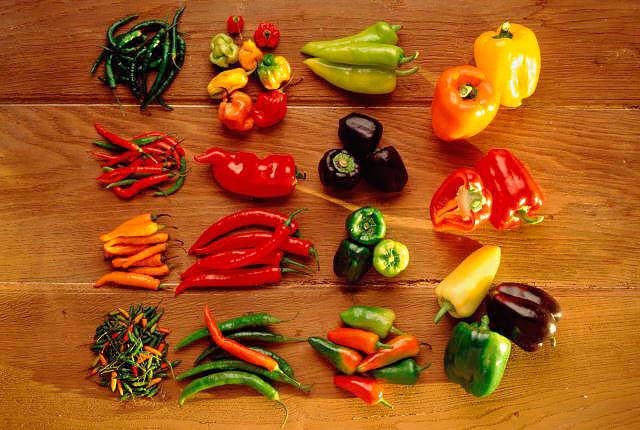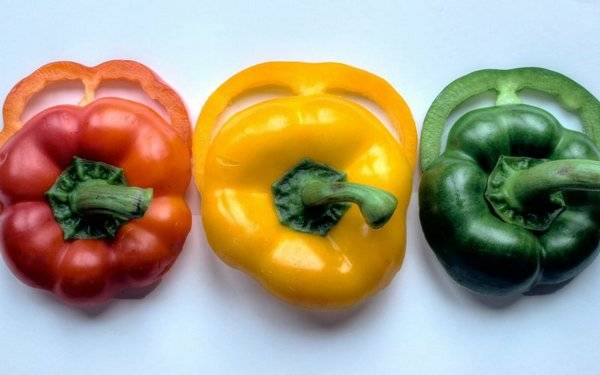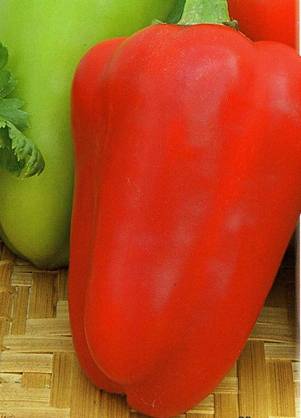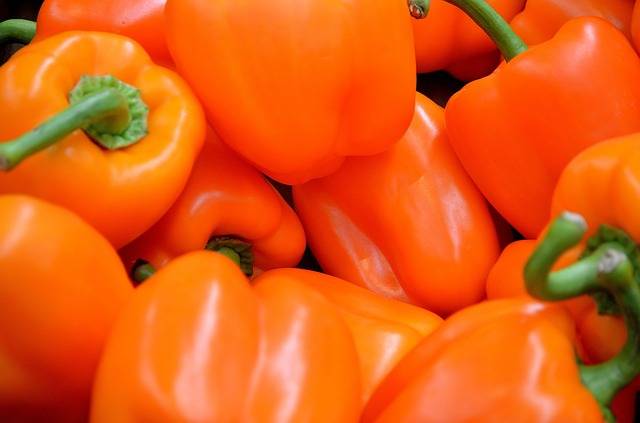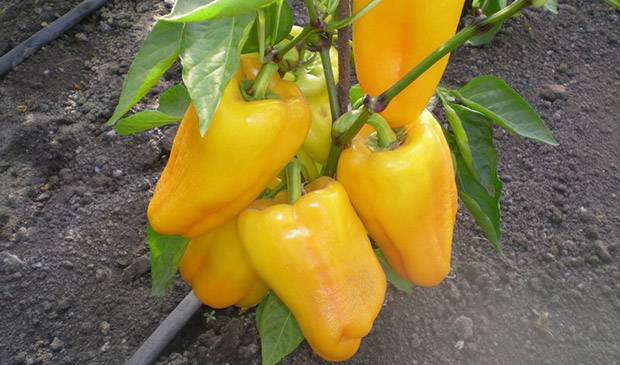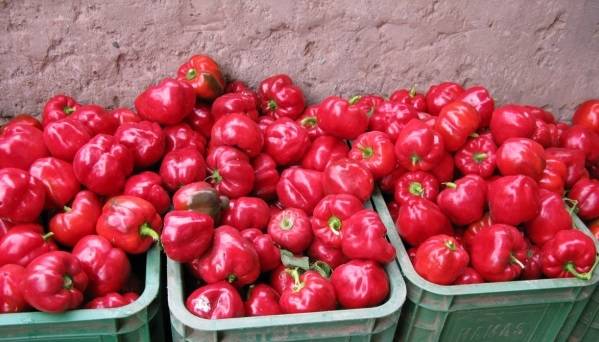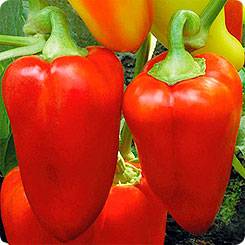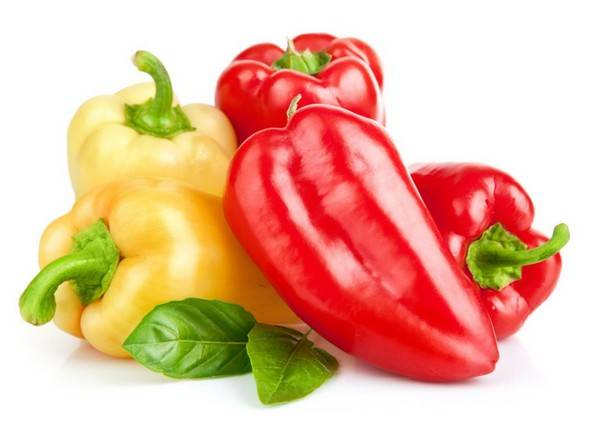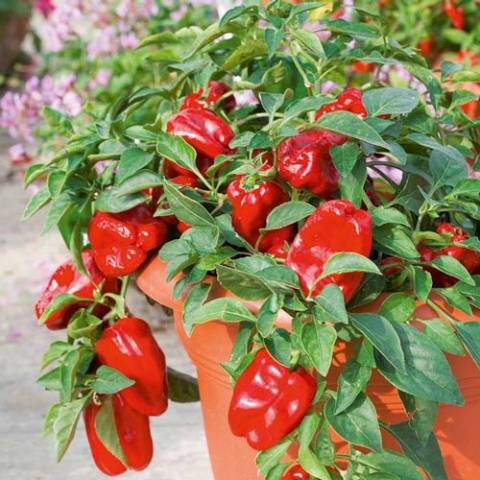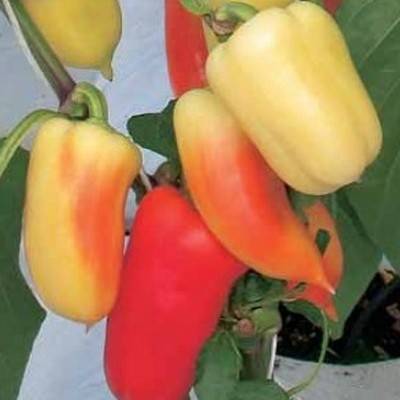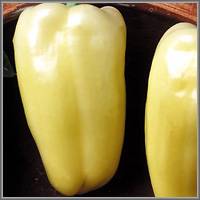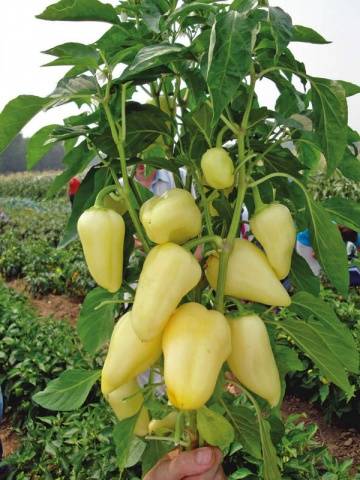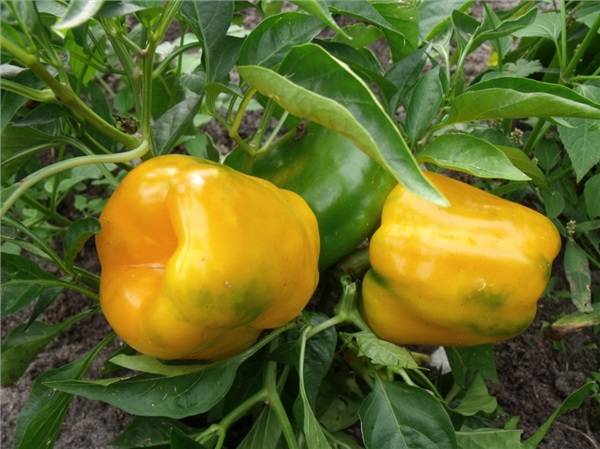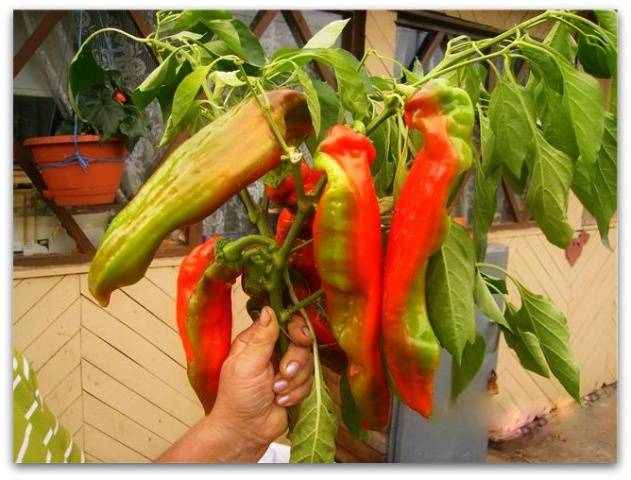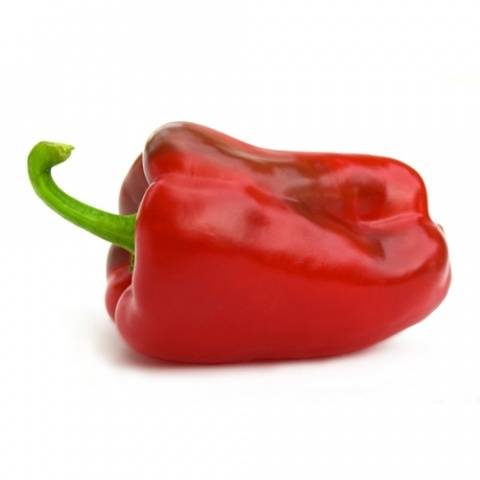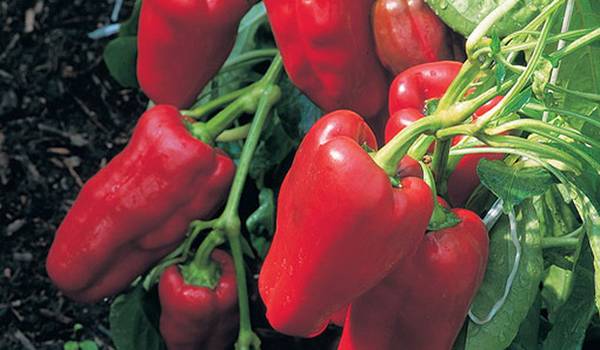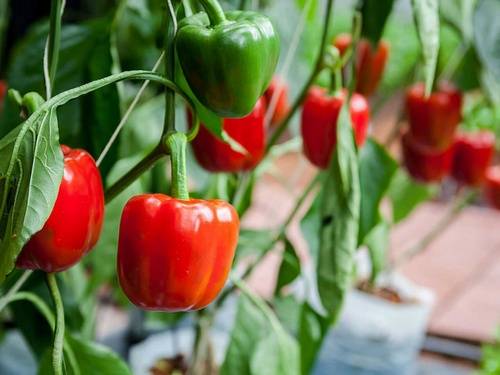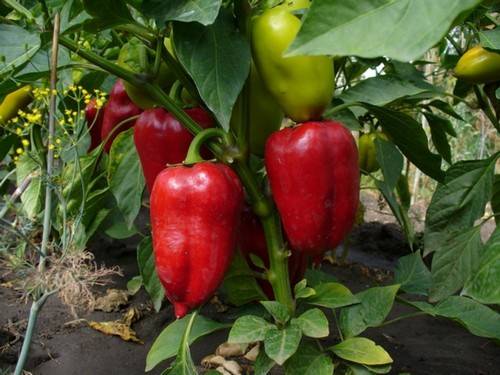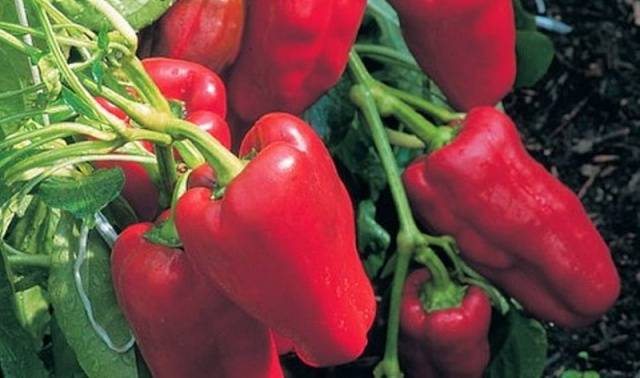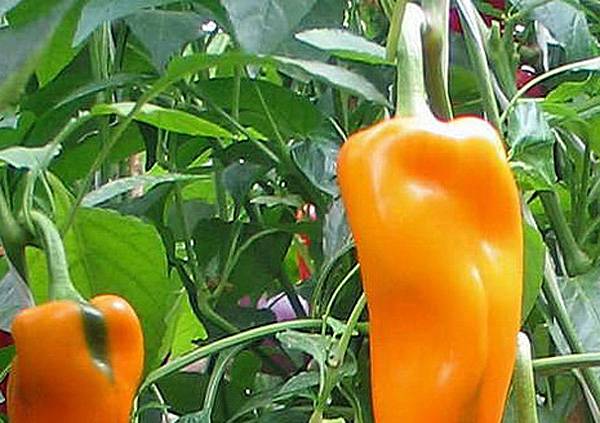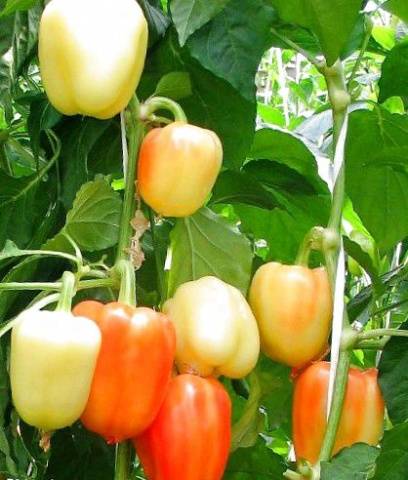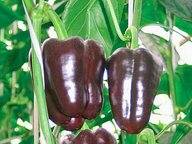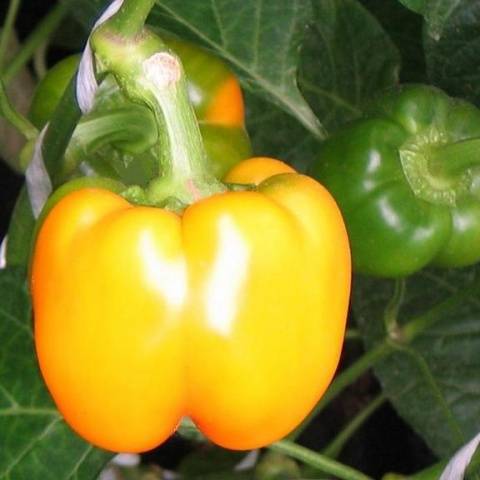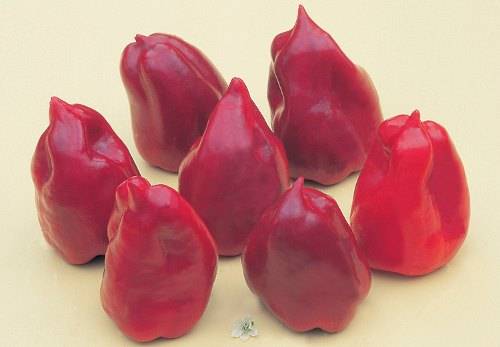Content
Most often, vegetable growers prefer early and mid-early varieties of pepper. This is due to the desire to get the harvest of fresh vegetables faster. The cultivation of early varieties in Siberia and the Urals is especially important because of the short summer. Thanks to the work of breeders, the newly bred crops acquired immunity to diseases, became unpretentious in care and improved the taste of the fruits. Early ripe sweet peppers are planted with seedlings in open or closed ground.
What is better to choose a variety or still a hybrid
This question is relevant for gardeners who are accustomed to growing pepper from the grains themselves. Buying seeds from the store sweet pepper with the marking on the F1 packaging, you need to know that this is a hybrid. It will not be possible to get seed material from it for subsequent plantings. The fact is that hybrids, when propagated by seeds, cannot inherit varietal parental genes. With some hybrids, if desired, it will be possible to collect grains, but the plants grown from them next year will bring completely different fruits of worse quality than they were originally. To grow an early hybrid of pepper, you will have to buy new seeds every year.
However, sweet pepper hybrids have a number of advantages over varietal counterparts:
- The hybrids are distinguished by high yields, larger and fleshy fruits.
- Breeders instilled in the plant immunity from various diseases. The culture has become resistant to cold weather.
If we compare the taste of hybrids with varietal peppers, then the former often win in this regard.
Difference in shape and size
Most often, such indicators are important if the fruits of sweet peppers are grown for the preparation of certain dishes, for example, stuffing. For these purposes, oval or spherical vegetables are better suited, although some housewives prefer to stuff cone-shaped fruits. It is better if the vegetable is thick-walled. Fleshy juicy pulp in such a dish will be tastier.
Sweet pepper fruits come in the form of a cube, cone, ball, cylinder, oval, or simply elongated. In addition, the walls themselves can be smooth, ribbed or tubercles. These indicators are still taken into account when planting peppers in a decorative area. All characteristics can be found on the seed packaging of a particular pepper variety at the time of purchase.
Difference of fruits by color
This indicator is not so important, since it is used more for decorative purposes. The color of sweet peppers in many varieties changes as they ripen. Initially, all peppercorns are green, only shades can differ - light and dark. As it ripens, the walls of the vegetable, depending on the variety, turn red, yellow, white or orange. There are even dark purple peppercorns.
Other distinguishing features
When choosing varieties of peppers, you need to pay attention to a number of signs, on which the complexity of caring for a plant and the use of fruits for their intended purpose depends.For example, a plant of each variety can grow from 30 to 170 cm in height. For tall varieties, you will have to make trellises for tying branches. Some crops require bush formation. For example, the variety "Snow White" needs to pluck the lower shoots.
It is important that the plant is resistant to various diseases, cold weather, excess or lack of moisture. This will greatly simplify the care of the crop. As for the fruits, you need to decide what they are for: conservation, fresh salads, sale, etc. You may need varieties, the fruits of which are distinguished by long-term storage without losing their presentation.
Review of the best early varieties
So, it's time to consider the early ripening varieties of peppers. Let's start our review, as always, with the best, in the opinion of vegetable growers, crops.
Tenderness
The early ripe variety brings its first harvest 110 days after the seedlings germinate. The plant has a medium spreading bush, growing to a maximum of 80 cm in height. The pyramid-shaped peppers weigh about 100 g. As they ripen, the green flesh turns red. One bush brings 2 kg of harvest.
Corvette
A very early ripening variety brings its first harvest 90 days after seed germination. Bushes with a slightly spreading crown grow to a maximum of 70 cm in height. Small cone-shaped peppers weigh about 80 g. The purpose of vegetables is universal. The culture is recommended for planting in open beds.
Lemon Miracle
The first crop after germination can be harvested after 110 days. A plant with a maximum height of 1 m requires a partial tie of the branches. As they mature, the walls change from green to bright yellow. Vegetable weight - about 180 g. The culture is resistant to aggressive weather conditions, diseases and is recommended for planting on open beds, as well as under a film. The purpose of the fetus is universal.
Latino F1
The hybrid brings its first harvest 100 days after the seedlings germinate. Tall bush up to 1 m in height. Cuboid red peppercorns weigh about 200 g. A high-yielding hybrid brings up to 14 kg of crop per 1 m2... As intended, the vegetable is used for fresh consumption.
Prince Silver
The first harvest can be obtained 90 days after the seedlings germinate. The plant grows to a maximum of 68 cm in height. About 2.6 kg of crop can be removed from 1 bush. Cone-shaped red peppercorns weigh about 95 g. Among the early varieties, the crop is considered the best choice for growing in open and closed beds. Vegetables are eaten fresh or used for salads.
Swallow
This variety is more related to the mid-early ripening period. A tall plant up to 1 m in height is grown on beds covered with a film. Cone-shaped peppercorns with a pulp thickness of 6 mm weigh about 80 g. As they ripen, the pulp changes from green to red.
Winnie the Pooh
The culture is intended for cultivation in open and closed beds. The peppers ripen together. Red-orange vegetables with a pulp thickness of 6 mm weigh about 70 g. From 1 m2 you can get about 9.5 kg of the crop. The maximum height of the bush is 30 cm. Vegetables are considered universal, they can be stored for about a month without losing their presentation.
Snow White
The culture is recommended for growing under film. The bush grows to a maximum of 50 cm in height. Cone-shaped peppers with a wall thickness of 7 mm weigh about 90 g. The purpose of the vegetable is universal.
Dwarf
An early ripening crop grows to a maximum of 40 cm in height. The cone-shaped fruits with a 7 mm thick flesh weigh about 80 g. As they ripen, the green peppercorns acquire a yellowish tint. The purpose of the vegetable is universal.
General description of early varieties
Having reviewed the best varieties, let's smoothly move on to familiarize ourselves with other equally popular peppers of the early ripening period. Typically, these crops produce crops 90–120 days after seedling germination.
Ivanhoe
After about 100 days, the bush brings the first ripe harvest. A medium-sized plant does not need a garter. Cone-shaped peppercorns weighing about 140 g are plucked white. During storage or if the vegetable is left for seeds, the walls turn red. Average meatiness - about 7 mm in thickness. The purpose of the vegetable is universal.
Belozerka
The culture belongs to the mid-early ripening period. The first harvest can be obtained after 120 days from the moment the seeds germinate. A bush of medium height does not require a garter of branches. Conical fruits with a wall thickness of 5 mm weigh about 140 g. Peppers are picked white, however, if overexposed, they turn red. The yield is approximately 8.7 kg from 1 m2... The purpose of vegetables is universal.
Bohdan
Highly early variety of peppers bears ripe fruits after 90 days. The plant grows to a maximum of 70 cm in height, but the structure of the bush requires a garter of branches. Cone-shaped peppercorns weighing 200 g have fleshy walls 9 mm thick. The purpose of the vegetable is universal.
Cockatoo F1
The hybrid brings the first harvest 100 days after germination of the seedlings. Large curved fruits weigh about 520 g. Thick pulp up to 10 mm is saturated with sweet juice. As it ripens, the vegetable turns bright red. Bushes of medium height grow to a maximum of 50 cm in height. From 1 m2 you can get about 8 kg of crop. The purpose of the vegetable is universal.
Mercury F1
The hybrid brings the first crop in 95 days after germination of seedlings. Maturation occurs on day 120. A powerful shrub with a height of 1.6 m with long branches grows in heated greenhouses. Under a cold shelter, the maximum plant height is 1 m. The cone-shaped fruits with a flesh thickness of 7 mm weigh about 200 g. As they ripen, the peppercorns turn red. The purpose of the peppers is fresh consumption.
Overview of early cold-tolerant varieties
Pepper is a thermophilic culture. The fruit of not every variety will have time to ripen before the onset of cold weather in regions with short summers. For such weather conditions, a cold-resistant vegetable is required, characterized by undersized bushes and unpretentious care. However, this does not mean that the fruits will differ in taste from their southern counterparts. Breeders have bred many of these crops, characterized by a compact bush, resistance to aggressive weather conditions and common diseases.
Czardas
The fruits that have grown in 100 days are fully ripe in 130 days. The compact shrub grows to a maximum of 60 cm in height. Cone-shaped peppers with a pulp thickness of 6 mm weigh about 220 g. As they ripen, the yellow fruits turn orange with a reddish tint. From 1 m2 you can get up to 10 kg of harvest. Growing is recommended in open beds and in a greenhouse.
cabin boy
Fully ripe fruits can be obtained after 115 days from the moment the seedlings germinate. Bushes grow small with a maximum height of 70 cm. Cone-shaped peppers with a pulp thickness of 6 mm weigh about 180 g. As they ripen, the green peppercorns tilt to red. Cultivation of the culture is recommended under the film and in the open field.
Eroshka
The cold-resistant variety brings the first harvest 110–120 days after germination of the seedlings. The undersized bush grows to a maximum of 50 cm. Cuboid peppercorns with pulp 5 mm thick weigh about 180 g. As they mature, the green color changes to orange with a red tint. A high yield is accompanied by amicable ripening of fruits. The purpose of the vegetable is universal.
Funtik
The first crop can be removed from the bush after 120 days from the moment the seedlings germinate. A compact shrub 70 cm high with dense foliage.As it ripens, the color of the fruit changes from green to red. Cone-shaped peppers with a flesh thickness of 7 mm weigh about 180 g. The cultivation of the culture is recommended in the open field and under a film.
Pinocchio F1
The culture brings early harvests 90–100 days after the seedlings germinate. The plant is distinguished by an average growth of a bush up to 70 cm high. Conical fruits with a pulp thickness of 5 mm weigh about 120 g. As they mature, the walls turn red. The culture is characterized by amicable ripening of fruits and resistance to diseases. Vegetables are considered to be of universal use.
Chord
The first crop can be removed from the bush 110 days after the seedlings germinate. Bushes can grow up to 1 m tall. When ripe, the green walls change color to red. Conical fruits with a pulp thickness of 6 mm weigh about 190 g. The purpose of the vegetable is universal.
Barguzin
The first crop is harvested after 110 days, and then it is considered technically ripe. The height of the bushes is about 80 cm. At biological maturity, the green flesh changes color to red. Conical fruits weighing 200 g have a juicy pulp with a thickness of 6 mm. The culture adapts well to the local climate.
Tomboy
The culture brings the first crop after 108 days from the moment the seedlings germinate. Green peppercorns with a yellowish tinge turn orange when ripe. The weight of cone-shaped fruits with a rounded tip and 7 mm flesh thickness is about 160 g. The plant is distinguished by amicable fruiting. Up to 30 fruits can be set on a bush.
Cornet
The crop can be harvested in 115 days, but for full ripening, you need to wait 140 days. A tall plant can grow to a maximum of 1.8 m in height in a heated greenhouse with minimal foliage. Prismatic peppers with a pulp thickness of 6 mm weigh about 220 g. As they ripen, the color of the walls of the vegetable changes from green to brown. The crop is recommended for growing in a greenhouse.
Bagration
The crop can be harvested after 110 days from the moment of planting the seedlings. The plant is characterized by an average growth of a bush with a maximum height of 80 cm. Ripe peppercorns are colored yellow. Cuboid fruits with a pulp thickness of 8 mm weigh about 200 g. The purpose of the vegetable is universal.
Nafanya
Our review of cold-resistant early peppers is completed by the Nafanya cultivar. The first harvest can be taken 100 days after the seedlings germinate. The plant is medium vigorous, maximum 90 cm in height. Ripe vegetables turn red on the walls. Peppers with a flesh thickness of 8 mm weigh about 170 g. The plant is resistant to aggressive weather conditions and many diseases.
The video provides an overview of the varieties of pepper:
Conclusion
We have considered the most popular varieties of early maturing peppers, which are loved by many gardeners. Maybe someone from novice vegetable growers will also find a suitable crop for themselves from our review.
